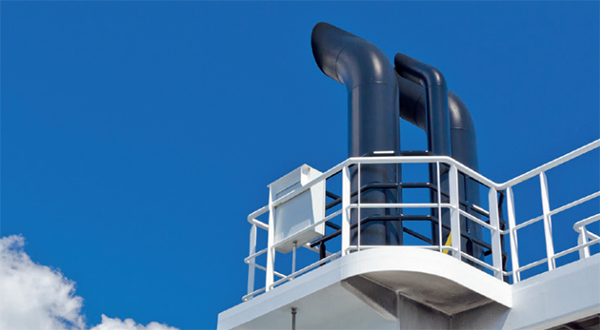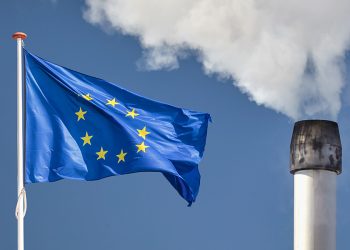Stamatis Fradelos, ABS gave a presentation on ‘’EU MRV Future Challenges’’ during the 2016 GREEN4SEA Conference & Awards. He said that there are various factors that can lead to inaccuracies in fuel measurement and subsequently in emissions reporting inconsistency.
Therefore, ship operators would need to undertake due diligence to ensure the highest achievable accuracy and transparency. He advised they would need to take responsibility for the quality assurance of the measurement equipment, the consistency of the measurement methods and the competence of the involved personnel, while ensuring the data are collected, transferred, processed, stored and retrieved (data flow) in a transparent way.
The European Union’s Regulation 2015/757 covering the Monitoring, Reporting and Verification of CO2 emissions from ships sailing in European waters has significant implications for shipowners and operators.
These include the need to establish and maintain accurate processes for all aspects of the regulation to ensure they are in compliance in time for the deadlines, working in co-operation with the relevant stakeholders.
To support clients in their preparations for MRV implementation, ABS has undertaken a project with clients and other stakeholders to establish a clear interpretation of the regulation, how it will affect users and what steps must be taken to achieve and demonstrate compliance. It seems that companies will need to look in three specific elements into their existing systems and procedures:
The quality of the data produced onboard to ensure that meet an acceptable level of accuracy. Whether fuel measurement procedures are in accordance with recognised standards and to ensure the quality of the measurement equipment (calibration schedules, maintenance schedules, availability of necessary parts).
Then the existing data flow to ensure that the data are being transferred, processed stored and retrieved in a controlled and well organised manner. Necessary controls need to be in place to assure that there will not be any errors, omissions or misrepresentations.
Finally the existing reporting system to ensure that the reports produced include all the required information defined according to the Regulation.
During the project Companies assessed their existing fuel measurement methods to identify any possible causes for inconsistency in fuel measurement and the following fishbone diagram has been developed:
Six areas have been identified and analyzed:
- Equipment: Any equipment, computers, tools, etc. required to accomplish the relevant measurement accuracy and possible failures.
- Processes: Fuel measurement methods and the corresponding specific requirements such as policies, procedures, rules, regulations and laws.
- People: Anyone involved with the process of fuel measurement and data handling need to be competent to use the measuring device and properly follow the procedures.
- Material: Includes the property of the fuel and air, water or other impurities.
- Environment: The conditions, such as location, temperature, trim/list etc. that may influence the measurement.
- Management: Responsibilities, roles and evaluation of fuel measurement methods and data handling.
From the time that data produced onboard there are different ways that this data can be transferred into the company in order to be assessed. It can be performed manually, through noon reports, semi-automatically with human intervention or automatically by continuous real-time monitoring systems. Whatever the method and system applied, generated data are of utmost importance and should be treated in a controlled manner. Consideration should be given to “what can go wrong” with each data source, data handling or processing step. Examples are for instance if the flow meter is inaccurate, data transmission fails, meters are read inaccurately, readings are logged down incorrectly, hard disks for storage crash, etc. To avoid issues such as those listed above, ship-operators should follow three main steps:
- Identify the data sources and measurement/calculation activities and then create a logical sequence of data collection and processing steps (data flow). Examples for data flow activities include reading from instruments, aggregating data, converting volume to mass, and storing.
- Mistakes in these activities can be expected, as on-board and on-shore staff are involved and interact with information technology systems. Therefore, ship-operators need to assess the risks associated with this data flow (i.e. errors, misrepresentations, omissions) and set up appropriate control measures for mitigating the identified risks.
- Finally, after the application of control measures, the operator will need to assess the risks once more to ensure that these have been effectively applied and the remaining risks are sufficiently low for the data flow system to produce a fuel measurement report which is free from material misstatement.
The outcome for the company will be a well-defined data flow (when and who takes which data from where and what does he do with these data and where he stores data thereafter), a set of control activities (e.g. search for duplicates or data gaps, control check by an independent person) and a risk assessment (demonstrating that the risk for errors is reduced to an acceptably low level).
Ship-operators may establish and maintain written procedures related to control activities for at least:
- Quality assurance of the measurement equipment (calibration schedules, maintenance schedules, availability of necessary parts)
- Quality assurance of the information technology system used for data flow activities. Control is to be exerted in particular regarding access to the systems, backups, recovery, maintenance and security.
- Segregation of duties in the data flow activities and control activities (four-eyes principle)
- Internal reviews and validation of data (i.e. comparison of data over time, cross checks between different methods used for fuel consumption measuring, etc.)
- Corrections and corrective actions (e.g. replacement of a bad measurement instrument, improvement of control activities, etc.)
- Control of out-sourced processes (e.g. bunkering, external laboratory analyses, maintenance of measurement equipment)
- Keeping records and documentation including the management of document versions in a controlled manner.
It is advised that Companies should also take under consideration amendments through the delegated acts to the methods set out in Annex I and the rules set out in Annex II, expected to be published by the end of this year.
Above text is an edited article of Stamatis Fradelos presentation during the 2016 GREEN4SEA Conference & Awards
You may view his presentation video by clicking here
The views presented hereabove are only those of the author and not necessarily those of GREEN4SEA and are for information sharing and discussion purposes only.
[divider]
About Stamatis Fradelos
Principal Engineer ABS – EU MRV Future Challenges

Stamatis Fradelos is Principal Engineer in the Operational Environmental Performance (OEP) department of American Bureau of Shipping (ABS). The OEP department provides technical support on energy efficiency, vessel performance and environmental matters. Prior to joining ABS, Stamatis worked as a marine field surveyor for five years at the Hellenic Register of Shipping and spent six years at Lloyd’s Register as a Plan Approval Surveyor. Stamatis has a M.Sc. in Mechanical Engineering (NTUA), a M.Sc. in Marine Technology and Science (NTUA) and a M.Sc. in Engineering – Economic Systems (NTUA, UoA, UoP).































































